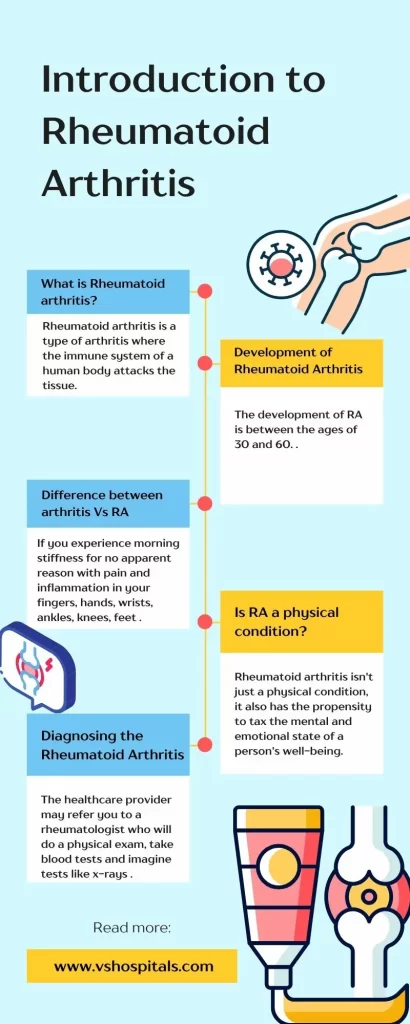Introduction to Rheumatoid Arthritis is a type of arthritis where the immune system of a human body attacks the tissue which lines the joints on both sides of the body besides affecting other parts of the body. The exact cause is still unknown but the variety of treatment options include change in lifestyle, physical therapy, nutritional therapy, occupational therapy, medication and surgery.
The development of Rheumatoid Arthritis is between the ages of 30 and 60. However, the older generation who are aged over 65 are more prone to the Rheumatoid Arthritis disease which is called as the later-onset rheumatoid arthritis. It is found in younger generations aged between 16 and 40 including children (the young-onset rheumatoid arthritis).
How can it be different from other types of arthritis? (Introduction to Rheumatoid Arthritis)
Well, if you experience morning stiffness for no apparent reason with pain and inflammation in your fingers, hands, wrists, ankles, knees, feet or toes you might be suffering from one of its symptoms. It can affect everyone differently.
In some people introduction to rheumatoid arthritis would develop over several years, some will have the progress of the symptoms rapidly whereas for some there will be no symptoms at all. When you get mild symptoms itself, you ought to give some serious thought and consult with your doctor because usually the morning stiffness is related to rheumatoid arthritis.Introduction to rheumatoid arthritis isn’t just a physical condition, it also has the propensity to tax the mental and emotional state of a person’s well-being. It can change your way of working style, interaction with your family, and prevents you from entertaining yourself with recreational activities.
What are the causes of rheumatoid arthritis?
The exact cause is unknown as mentioned above but as per the research study it is said that the main causes of introduction to rheumatoid arthritis include a combination of hormones, genetics and environmental factors. Normally, the immune system in a human body can protect against this disease but it can also trigger your immune system to attack your joints with an infection, smoking or physical and emotional stress.
Arthritis works in two ways, Firstly, it causes uncontrolled inflammation in your muscles, ligaments damaging your cartilage to deform your joints and erode your bones leading to the fusion of your joint where you understand this disease has to become vital.
Secondly, the arthritis causes pain, swelling and heat to the specific cells in your immune system can cause symptoms throughout your body affecting your skin, eyes, mouth, heart and lungs and doesn’t allow for easy movement. In the worst scenario, the cartilage will disappear completely which can be extremely crippling causing more discomfort. That’s why we term ‘rheumatoid arthritis’ as a disease.

What are the factors of risk for the development of rheumatoid arthritis?
There are several risk factors like the family history, sex, smoking and obesity. Studies have stated that most of the genetic variations for people depend on HLA (human leukocyte antigen) genes and non-genetic factors like exposure to irritants and pollutants leading to the potential risk factors of rheumatoid arthritis.
The most important goal to treat rheumatoid arthritis is to reduce the joint pain and swelling because it can maintain or improve joint function. The long-term goal of treating rheumatoid arthritis is to slow or stop joint damage. Controlling joint inflammation will reduce your pain and improve your quality of life. But with proper medications, support, education, and prescribed exercises, you can prevent the most severe forms of the disease or at the most can prolong the worst-case symptoms.
Side effects
Signs and side effects of rheumatoid joint pain might include:
- Delicate, warm, enlarged joints
- Joint solidness that is typically more awful in the mornings and after idleness
- Weariness, fever and loss of craving
How is rheumatoid arthritis diagnosed?
Your healthcare provider may refer you to a rheumatologist who is an expert in diagnosing people with rheumatoid arthritis based on a combination of several factors. They’ll do a physical exam, take blood tests and imagine tests like x-rays, ultrasound and MRI scans and also enquire about your medical history and symptoms to provide an effective treatment.
Read also Top 10 Nephrologists in Chennai.
